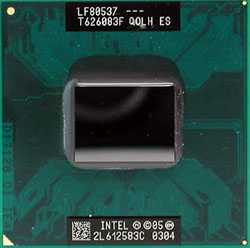Inside Apple's new Core 2 Duo chip


Core 2 Duo Microprocessor
Apple has upgraded the MacBook Pro to the latest Intel silicon and the Core 2 Duo chip features a 64-bit architecture. Unfortunately, Mac OS 10.4 is only a 32-bit OS. The good news is that Apple has promised that Mac OS 10.5 (Leopard) and most of their software will be 64-bit aware by the time Leopard is released in the Spring of 2007.
The other significant bump in the Core 2 Duo processor is that it ships with 4MB of Level 2 cache, double the L2 cache in the previous MacBook Pro. That alone should add a noticeable performance jump in the new MacBook Pro.
Apple has floated a pretty impressive performance statistic of the new MBP stating that it is "39 percent faster than the previous generation." If you read the footnote you'll notice that this figure is based on "estimated results of industry-standard SPECint and SPECfp rate tests." You should also note that the 39 percent improvement in performance quoted is between the new 2.33GHz Core 2 Duo and the previous generation 2.16GHz Core Duo processor. The extra 170MHz will also add a slight performance boost to the new model.
Others have taken issue with the 39 percent faster metric.
One Digg commenter "Streak" notes:
Code that is simply recompiled for the 64-bit instruction set can easily execute 30% faster, compared to the same code compiled for the old 32-bit instruction set and executed on the same processor. Even Jobs went over this in his WWDC '06 keynote.
Another commenter "rtini" notes:
The performance increases for people using well-written multithreaded applications are much better than for running typical single-threaded stuff. Basically all of Apple's software is well-written multithread applications, so it benefits really well from Core 2 Duo's improvements.
Each core is running at least 6% faster than with the Core Duo from the 4MB L2 cache alone. The floating-point performance is better too, so applications using floating point will see a bit more improvement. There are new SSE instructions for vector processing, so audio/video processing software can get performance gains from that - if the software is designed to take advantage of the new SSE instructions. Add to all of that the new 64bit capability, and you have the potential for big performance gains.
So there you have it, the Core 2 Duo (T7600) is definitely a nice upgrade for MacBook Pro buyers, but it probably isn't enough to sell your 10-month old Core Duo (T2600) to get. Once Apple releases their first, true 64-bit OS (Mac OS 10.5) then everything will change again.
Full Core 2 Duo benchmarks can be found at TG Daily.
Poll: What are you going to buy (if anything):
[poll id=2]